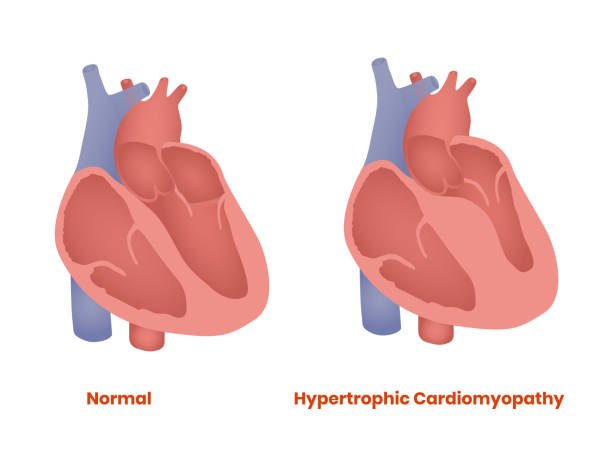
Heart Cardiomegaly! Definition, Causes, Symptoms, Diagnosis, Treatment
What is cardiomegaly?
Cardiomegaly is not a disease, but refers to the enlargement of the heart found through chest X-ray examination. However, Cardiomegaly is generally called “heart hypertrophy”, which is actually a big misunderstanding. In terms of simple literal meaning, cardio means heart and megaly means big. The literal translation of Cardiomegaly is “big heart”. It only refers to the enlargement of the heart and does not necessarily include it. Myocardial hypertrophy. For example, in dilated cardiomyopathy, the main chamber responsible for sending blood (the left ventricle) is enlarged, but the heart muscle is normal or becomes thinner and becomes weaker.
How common is heart Cardiomegaly?
It is common for patients with a history of high blood pressure or heart disease to develop cardiac enlargement. If patients with high blood pressure are not treated properly and timely, over time, they will first develop cardiac hypertrophy (Hypertrophy), then cardiac enlargement (Cardiomegly), and then enter heart failure. In addition, older people are more likely to have cardiac enlargement than younger people. It is worth noting that taking good self-health care and reducing risk factors can reduce the chance of suffering from cardiac hypertrophy. Please further discuss relevant information with your doctor.

Causes of cardiac hypertrophy
There are many reasons for cardiac hypertrophy. Certain heart diseases (such as congenital heart disease) or other factors will make the heart pump harder, causing the heart’s load to increase. Over time, cardiac hypertrophy will form, and then Evolves into heart enlargement.
In addition, heart infection or myocardial infarction can also directly damage the myocardium and increase the risk of cardiac hypertrophy. Here are the 11 most likely causes of heart enlargement:
- High blood pressure:
Long-term high blood pressure may cause left ventricular hypertrophy, because the heart must work harder to pump blood throughout the body, causing heart muscle hypertrophy and then enlargement of the heart. In addition, high blood pressure can cause the atria, the upper part of the heart, to enlarge. - Valvular heart disease:
The heart valve is an important valve that prevents blood from flowing backward. If the valve is damaged due to factors such as rheumatic fever, congenital heart defects, heart infections, connective tissue diseases, etc., the blood will flow backward and the ventricles will enlarge. . (Recommended reading: Valvular heart disease) In addition, if combined with atrial fibrillation, the blood accumulated in the left atrium will not flow smoothly to the left ventricle, and thrombus will easily form in the left atrium. Once the thrombus breaks off and is hit to the aorta, it will May cause strokes everywhere. - Cardiomyopathy:
Cardiomyopathy can cause ventricular dilation, myocardial hypertrophy or myocardial fibrosis, making it difficult for the heart to pump blood, thereby reducing cardiac output. - Coronary artery stenosis:
In patients with coronary heart disease (Coronary heart disease, also known as ischemic heart disease), the heart blood vessels become narrow, which causes the heart to beat harder to output a sufficient amount of blood. Over time, this will lead to heart disease. Hypertrophy and then heart failure. - Myocardial damage:
Myocarditis or myocardial infarction can damage the myocardium, causing scarring in the myocardium, leading to myocardial hypoxia, arrhythmia, etc., which may lead to cardiac hypertrophy. - Pericardial effusion:
The pericardium is a sac-like tissue outside the heart, which contains pericardial fluid composed of lymph, which serves as a buffer and lubrication. When hydropericardium is present, an enlarged heart may be seen on a chest X-ray. When a large amount of pericardial hydrops accumulates, it will compress the heart and affect hemodynamics, which is called cardiac tamponade. - Low red blood cell count:
It represents anemia. There are not enough healthy red blood cells in the patient’s body to carry oxygen to various tissues in the body. If not treated properly, chronic anemia can cause a fast or irregular heartbeat, and the heart must increase its blood supply to make up for the lack of oxygen caused by anemia, leading to heart enlargement. - Thyroid disease:
Hypothyroidism and hyperthyroidism, both of which can lead to heart enlargement and other heart problems. - Too much iron in the body:
Hemochromatosis (also known as hemochromatosis) is a disease in which the body cannot metabolize iron normally, which causes iron to accumulate in various organs in the body, including the heart. Iron deposition in the heart will first affect diastolic dysfunction (such as restrictive cardiomyopathy) and cause arrhythmia, and eventually lead to dilated cardiomyopathy (Dilated cardiomyopathy), which is systolic dysfunction (Systolic dysfunction). - Amyloidosis:
a rare disease in which patients have two types of protein abnormalities, one is light chain amyloidosis (AL) and the other is thyretin amyloidosis (ATTR). Abnormal proteins in the patient’s body will flow with the blood and be deposited throughout the body. If deposited in the heart, it may affect heart function. A typical change is restrictive cardiomyopathy. - Physiological cardiac hypertrophy:
Just like when we go to the gym to train hard, our muscles will become hypertrophy (Hypertrophy). When athletes engage in high-intensity exercise training or competition for a long time, their hearts will also undergo adaptive hypertrophy to meet the needs of the body.

Symptoms of heart Cardiomegaly
Some people may have an enlarged heart without any signs or symptoms, while others may have the following signs and symptoms:
- Difficulty breathing, rapid breathing
- arrhythmia
- Edema
- fatigue
- Palpitation, or feeling that the heart temporarily stops beating for a brief period of 1 to 2 seconds
When should you seek medical help?
If you have the following signs and symptoms, please seek medical assistance immediately:
- chest pain
- Arm, back, neck, jaw, abdominal pain (atypical chest pain)
- severe difficulty breathing or shortness of breath
- faint
Risk factors for cardiac hypertrophy
Many risk factors can lead to heart enlargement, such as:
- High blood pressure:
A blood pressure higher than 140/90mmHg is considered high blood pressure. - Family history:
If your parents or siblings have heart enlargement, your chances of developing heart enlargement are also increased. - Heart disease:
such as coronary heart disease, congenital heart disease, heart valve disease, heart infection, etc.
Complications of cardiac hypertrophy
- heart failure
- cardiac arrest or sudden death
- thrombus
- heart murmur
Diagnosis and treatment of cardiac hypertrophy
Cardiac hypertrophy is usually initially examined through electrocardiography, and then imaging examinations are used to further understand the condition of cardiac hypertrophy. Other possible cardiac examination methods are as follows:
- Imaging examination: Use chest imaging examination to detect whether you have heart problems. Common examination items include: chest X-ray, cardiac computed tomography scan (CT scan), or cardiac magnetic resonance imaging (MRI).
- Electrocardiography
- Echocardiography
- exercise electrocardiogram (Stress test)
- Myocardial tissue biopsy (Biopsy)

Treatment for cardiac hypertrophy
Medical treatement
If your heart enlargement is caused by myocardial disease or other heart problems, your doctor may recommend that you take the following drugs, such as:
- Diuretics (Diuretics):
can reduce the sodium and water content in the body, and also help reduce the pressure on the arteries and heart. - Angiotensin-converting enzyme inhibitors (ACEI):
Help lower blood pressure. - Angiotensin receptor blocker (ARB):
For people who cannot take ACEI, ARB can provide the same benefits without causing side effects such as coughing. - Beta blocker:
can lower blood pressure and improve heart function. - Digoxin:
A cardiotonic drug that increases the strength of the heart muscle to contract and improves hospitalization for heart failure. - Anticoagulants:
Reduce myocardial infarction or stroke caused by blood clots. - Antiarrhythmics:
These drugs help the heart rhythm normally.

Other medical treatments
If medications fail to treat an enlarged heart, other medical treatments or surgery may be needed:
Medical equipment assistance: For patients with specific heart hypertrophy such as dilated cardiomyopathy, it is necessary to install a pacemaker (Pacemaker) that can regulate the contraction of the left and right ventricles (Ventricle). For patients who may be at high risk for severe arrhythmia, they may need to take medications or install an implantable cardioverter-defibrillator (ICD) to prevent sudden, life-threatening arrhythmias.
- Heart valve surgery:
If heart enlargement is caused by a problem with a heart valve, heart valve surgery may be needed to repair or replace the problem heart valve. - Coronary artery bypass surgery:
If heart enlargement is related to coronary artery disease, your doctor may recommend coronary artery bypass surgery in severe cases. - Left ventricular assist device (LVAD):
Some patients with heart failure may need to be implanted with a mechanical cardiac assist device, which uses pump compression to assist the weak heart in sending blood to the aorta. In addition, ventricular assist devices can also be used as a bridge device for patients waiting for a heart transplant. - Heart transplant:
If medications fail to control your condition, a heart transplant should be a last resort.
How to Prevent Heart Hypertrophy
There is no specific way to prevent cardiac hypertrophy. In principle, prevention of heart disease can effectively reduce the risk of cardiac hypertrophy. Methods as below:
- Know your family medical history. If you belong to a high-risk group for cardiac hypertrophy, early detection can help with treatment.
- quit smoking
- maintain a healthy weight
- Eat healthily (avoid high cholesterol)
- Take blood pressure
- regular exercise
- Reduce alcohol consumption
- enough rest












